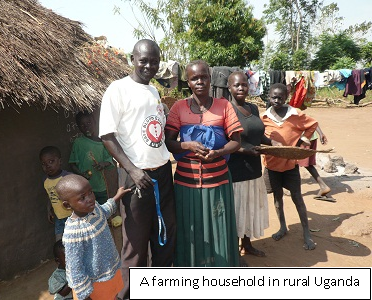Hosea S. Katende is Training Coordinator, CKW program, at Grameen Foundation’Uganda
 Resources, both human and financial, are being committed to reaching the bottom-of-the-pyramid communities. To contribute to this cause, Grameen Foundation’s AppLab Uganda came up with the Community Knowledge Worker initiative. An information and communications technology-driven model to accelerate knowledge and information uptake by rural farmers as part of its mission to reach out to the poor, especially the poorest, the CKW project builds a network of peer-nominated farmer leaders across Uganda who are trained to use mobile phones to share agricultural information with smallholder farmers living on less than $2 a day. This initiative demonstrates the power of the mobile phone in the agricultural space, leading to such benefits as improvement of food security and incomes for rural population (see Grameen’s model of business in a box).
Resources, both human and financial, are being committed to reaching the bottom-of-the-pyramid communities. To contribute to this cause, Grameen Foundation’s AppLab Uganda came up with the Community Knowledge Worker initiative. An information and communications technology-driven model to accelerate knowledge and information uptake by rural farmers as part of its mission to reach out to the poor, especially the poorest, the CKW project builds a network of peer-nominated farmer leaders across Uganda who are trained to use mobile phones to share agricultural information with smallholder farmers living on less than $2 a day. This initiative demonstrates the power of the mobile phone in the agricultural space, leading to such benefits as improvement of food security and incomes for rural population (see Grameen’s model of business in a box).
Funders of initiatives such as the CKW project usually set timelines to see results and impact within three to five years. Though these monitoring and evaluation goals are important, the bigger question is: How long does it take a person at the bottom of the pyramid to adapt to changes, let alone to new technologies?
From my experience working with the CKW project, I have observed that despite the potentially positive impact of any project, rural communities have a lot of social, cultural, political and historical baggage that tends to slow down the pace of adoption. Consequently, visible impact may not be realized in a short time. Community attitude is one of the biggest challenges associated with slow adoption of technologies. A number of people at the bottom of the pyramid feel marginalised and think that there is nothing much that they can do to change their living conditions. On the other hand, such people feel that physical handouts are what will help them, which is not sustainable. As a result, most of these people seem to have settled for their status quo.
Starting from the penetration time when farmers are mobilised to take part in programs, there is a tendency for some farmers to shy away, claiming that technology and different interventions belong to the few who have been to school. In addition there may exist groups that have positioned themselves as the elite of the village who may jump on the project quickly just for material gain. Some communities prefer to act as recipients and spectators to a programme, with no wish to engage in their own self-development. They essentially wait to see things done for and given to them. It takes a lot of skill to break through such barriers, and to help rural communities “own” their development.
For the CKWs, rural-based “information hubs” who left school more than 10 years ago, it takes substantial training and encouragement to transform them into effective intermediaries. They need to familiarize themselves with use of the mobile phone, have time enough to understand the value of information as an accelerator for development and, later, pass it on to the community (let alone passing it on to his/her community in an impactful manner). The time-lag between preparing for effective service delivery and changing farmer attitudes to realize impact should be appreciated to set expectations right.

Comments